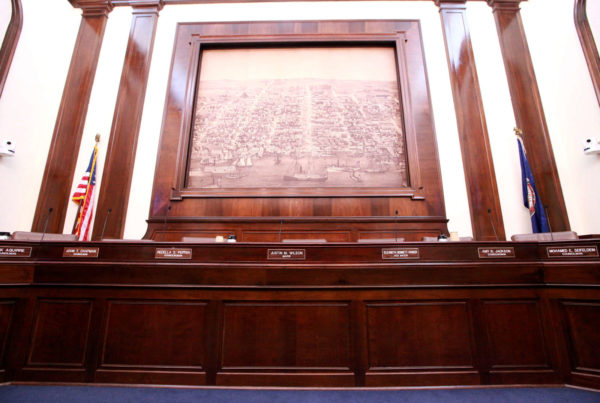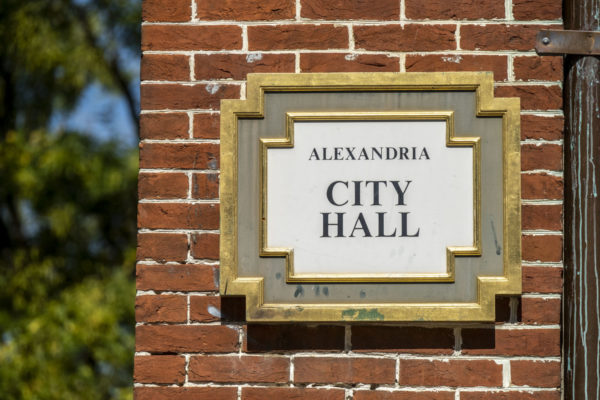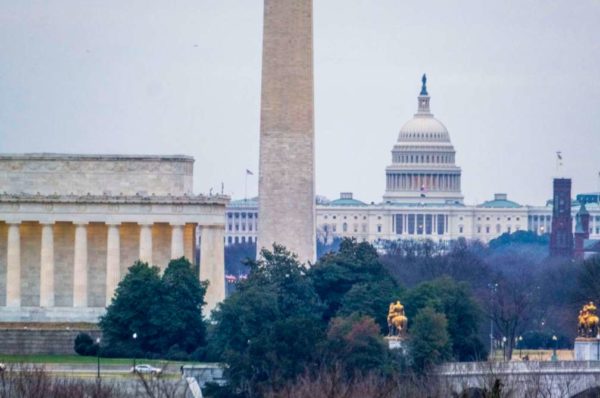Mark Jinks isn’t getting any younger, and the Alexandria city manager says he is closing in on the end of his career.
“I turn 70 in 2022,” Jinks told ALXnow. “I am closer to the end than the beginning, that’s for sure.”
Jinks said that things are slowly getting back to normal, as the city’s annual birthday celebration — held virtually last year — will be a limited attendance in-person event on the waterfront this time around. Additionally, starting Monday he said that City Hall’s treasury and tax collection windows will be open five days a week, and every office in the city will have at least two staffers working in person.
While Jinks has not made it official, rumors are swirling about his impending retirement. After six years as Alexandria’s City Manager and more than 20 years since he started work as the city’s budget director in 1999, Jinks and his wife are thinking about taking some time off in the near future to see their daughter who lives in Spain.
“Whenever I decide to make a decision and give Council notice, it would be with plenty of notice,” Jinks said. “Hiring a city manager is not putting an ad in the newspaper. The process can take six to nine months.”
Mayor Justin Wilson would not comment on personnel decisions or timing, but had kind words about Jinks’ performance throughout the pandemic.
“I don’t comment on personnel decisions and timing,” Wilson said. “That being said, the Manager’s leadership has been absolutely critical over the past year as we have worked to address the human, financial and economic impacts of the pandemic. Alexandrians are well-served by his leadership during this time.”
Jinks said it will take years for the city to get back to its pre-pandemic economy.
“I think tourism and business travel were the two pieces that got hit the most, as far as tax revenues are concerned,” he said. “International tourism is practically zero nowadays. Who knows when that will come back. I’d say it’ll be several years until we’re back to where we were.”
The Alexandria City Council unanimously adopted its $770.7 million fiscal year 2022 budget on Wednesday night, and it includes the first tax real estate tax reduction in 15 years.
Retiring Councilwoman Del Pepper made the motion to pass the budget, her last after 35 years on Council.
“This budget is filled with some good things that will be helpful to our citizens, and for me that is what counts,” Pepper said. “It is an opportunity to really move the city forward, and that’s really what’s important. I’m very pleased with the things that are in this budget, and I know that the staff has worked very hard.”
The motion was seconded by Councilman John Taylor Chapman.
“It has been a tough past fiscal year for all of us across the city and for businesses,” Chapman said. “I look forward to the future, to the growth that we can start to achieve.”
The upcoming fiscal year (an election year) will see real estate tax bills decrease from $1.13 to $1.11 per $100 of assessed value. At the same time, there is a $24.22 increase in the residential refuse collection fee, from $460 to $484.22.
All city and state employees will also get a 1% raise, and City Manager Mark Jinks said that $12 million, or a 2.3% reduction from last year’s budget, was made without impacting programs or services.
Mayor Justin Wilson said that city staff prepared a high quality budget during a period of incredible uncertainty. That uncertainty is eased, however, since the city will be getting approximately $59.4 million American Rescue Plan funds.
“We have only been successful this last year in getting through this moment because of our incredibly dedicated staff, in many cases doing jobs at physical risk to themselves and physical risk to their families,” Wilson said. “While we can never completely repay folks for that commitment and dedication, I think we were doing what we can in this in this environment.”
Councilwoman Amy Jackson thanked Jinks and staff for including the tax reduction into the budget.
“This is the year that is most needed,” Jackson said. “When our residents are looking at other avenues of how they are going to save money, how they’re going to pay their bills, how they’re going to feed their families and continue their jobs.”
Council also unanimously approved the 10-year $2.7 billion Capital Improvement Program, which includes $293 million in investments for schools, transportation, sewers, stormwater management, public buildings and facilities, and information technology.
“We are making some very significant investments in our infrastructure,” Wilson said. “I’m pleased to see that in this in this budget.”
Additionally, nearly $800,000 in Alexandria Police Department funding for School Resource Officers at Alexandria City Public Schools was “temporarily reallocated” to contingent reserves until the school system presents a proposal this summer on using the funds to provide mental health resources for school-age children, the Teen Wellness Center, and the hiring of an additional Behavioral Health Specialist for the Alexandria Crisis Intervention and Co-responding Program (ACORP). The proposal will have to be presented to City Council before their summer recess.
Alexandria City Council Adopts Fiscal Year 2022 Budget: https://t.co/QsXAlxD0Am.
— AlexandriaVAGov (@AlexandriaVAGov) May 5, 2021
Alexandria is expanding its push into public-private partnerships with the appointment of a new Assistant City Manager to help manage and facilitate them.
The city has sought to implement public-private partnerships over the last few years to lower costs for projects and make better use of limited space in the city. One notable example has been a housing development and fire station in Potomac Yard.
Julian Gonsalves has been appointed by City Manager Mark Jinks to lead the city’s public private partnerships through project planning and financing.
According to a press release:
Julian Gonsalves will leverage City assets and resources to implement City infrastructure-, facility- and economic development-related public and private sector partnership projects, and facilitate development and implementation of alternative service delivery strategies to lessen reliance on City funding. He will manage and coordinate these initiatives across multiple City departments and community organizations.
Gonsalves comes to the city after eight years at WSP USA, an engineering and construction management firm, where he specialized in public-private partnerships in dealins with organizations like the Baltimore City Department of Transportation, the Maryland Department of Transportation, Amtrak and more.
“Alexandria is known for developing innovative solutions that unite the financial and knowledge-based strengths of the private sector with those of the public sector to undertake complex projects, such as affordable housing, cultural development, environmental management, transportation and more,” Jinks said in the press release. “Julian’s regional, national and international experience in P3 program design and implementation will help the City implement the goals of its $2.7 billion, 10-year Capital Improvement Program and expand its P3 efforts in a cost-effective, responsible manner.”
City Manager Mark Jinks has proposed a budget this year that includes a real estate tax rate decrease of 2 cents.
The announcement came as welcome news to local property owners, from residents to business owners who faced a particularly difficult year as a result of COVID-19. The announcement was conjoined with a budget that belt tightening that trims down some of the city’s larger ambitions and won’t fill some currently vacant positions.
The budget also faced some detractors who argue that the city should take more steps to ease the burden on local residents and commercial property owners. In a recent Agenda Alexandria meeting, City Council candidate Bill Rossello said the narrative of a lightened burden on local residents doesn’t match the reality of an overall tax increase.
“I look at the budget the way it’s been presented and something that always seems to concern me is when we lead with a narrative around the tax rate,” Rossello said. “The tax rate is only one part of the equation for the actual taxes that people pay… While we’re looking at a proposed 2 cent tax rate decrease, when you do the math, for the average household it comes out to be almost a 6% tax increase in real dollars and that’s what really matters to residents: how much more or how much less am I going to pay?”
On the other side, some of the city’s transit and infrastructure ambitions are being scaled back as a result of the tax rate decrease. For instance, City Manager Mark Jinks said in the meeting that DASH will be forced to choose between density and coverage in a budget that will not allow it to keep all current lines operational and move forward with its planned higher-frequency service in areas of greater density.
operating dollars for DASH. Now if you increased DASH funding you could keep the existing route AND add more service to the higher demand routes. If you want more thoughts on the budget, DM me.
— YimbyAlexandria (@YimbyA) February 20, 2021
For all the earlier talk of doom and gloom early in the coronavirus financial forecasts, City Manager Mark Jinks’ proposed FY 2021 budget seems relatively painless.
As laid out by Jinks, the operating budget is a 1.9% proposed increase over last year’s, with a 2 cent real estate tax rate reduction, no major service reductions, and fully funds the proposed school CIP and operating budget.
The budget was reviewed at a City Council meeting last night (Tuesday) with a public hearing planned tomorrow (Thursday).
Jinks said the budget was made possible by $11.8 million in expenditure savings, driven in part by leaving 38 currently vacant positions unfilled. These positions, Jinks said, weren’t concentrated in any one particular department but were spread out across the city. No police department, fire department or emergency medical personnel were among the unfilled positions, he said.
The main budget proposed by Jinks includes a real estate tax rate reduction from $1.13 to $1.11, though Jinks also included other options to leave the tax rate as-is and fully finance some programs like a planned overhaul of DASH services.
In the existing budget, DASH will have to reallocate funding away from routes in less dense parts of the city if it wants to achieve its high density transit corridor goals — meaning some residents in areas like Seminary Hill could lose their local bus routes.
On the topic of transit: the budget also included a note that the King Street Trolley is planned to return in September, hopefully at the start of a fall tourist season.
Some of the budget’s goals include a renewed focus on what Jinks called “aggressively increased stormwater utility work,” including increasing maintenance on the stormwater system and new hires from additional engineers to sanitation workers.
A $5 million Holmes Run Trail restoration is also included in capital funding, with the goal of building a stronger dam on the creek that can withstand a harder beating after 2019’s devastating floods.
One of the other anticipated projects moving forward in next year’s budget is municipal fiber.
“We’ve been talking about replacing our rental from Comcast with our own network, which will give us and the school system greater capacity,” Jinks said. “In this project, we’re building two tubes, digging one for ourselves and a vacant tube next to it that we will be working to get a private sector entity to provide broadband service of some kind.”
Jinks said the multi-year construction project to connect 100 city and school facilities will start next year.
One of the biggest expenditures pushed back is a planned City Hall renovation. The city’s facilities are badly outdated, with some infrastructure dating back to just after World War II. Jinks said that renovation was pushed back in part because, with teleworking coming into the fore during the pandemic, “we don’t know what the future workforce will look like yet.”
The budget added 26.5 new positions, 18 of which are in the Department of Transportation and Environmental Services. In large part, these new jobs were part of a process to bring the city’s sanitation work in-house. Jinks said most of those 18 jobs are staffing for vehicles to pick up yard waste.
Jinks said departments scrubbing their budget and Federal aid through the worst of the pandemic played a big role in putting the budget together.
“This was probably the most uncertain budget process we’ve ever had,” Jinks said.
At the request of the City of Alexandria, Gov. Ralph Northam announced that a 6 p.m.-6 a.m. curfew and state of emergency are in effect in Alexandria and neighboring Arlington.
At the request of @AlexandriaVAGov and @ArlingtonVA, I am declaring a 6PM to 6AM curfew in these jurisdictions, with limited exceptions.
I am also issuing a State of Emergency in Virginia, so we can continue to respond.
— Ralph Northam (@GovernorVA) January 6, 2021
The announcement comes amid chaos in D.C. as rioters attacked the U.S. Capitol building this afternoon. Alexandria City Manager Mark Jinks was on a conference call with other regional leaders for a meeting in Arlington to determine public safety procedures.
Staff photo by Jay Westcott
For two years, city staff have been haggling over your water bill.
Late last week, the city announced that the State Corporation Commission (SCC) has significantly reduced Virginia American Water Company’s requested increase in customer water rates, which will result in a refund of previous overcharges to customers.
The water rate increase is still increasing by 2.9% — but that figure is substantially lower than what had been originally instated by the Virginia American Water Company. Homes and businesses that were overcharged will receive credits back. For the average home in Alexandria, the increase will be reduced by $40.
According to the press release:
In November 2018, the company applied to the SCC to increase revenue from water customers by up 15.84%, or up to approximately $6.6 million per year. In April 2019, at the direction of the Alexandria City Council, the City formally objected to the increase and encouraged the public to provide input. The City’s primary objections were that the company’s proposed return on equity (i.e., profit margin) should be lower; the rate of bill increases should be gradual and representative of national averages; and costs of serving customers should be appropriately and fairly allocated between residential, commercial and industrial customers.
At a City Council meeting last night, City Manager Mark Jinks outlined the extensive work and behind-the-scenes battles that took place to try to haggle that down — a process that involved pouring over hundreds of pages of documents to outline what the city was getting for what it spent and what a proper return on investment would be.
Jinks explained that there was some “gaming” going on for the Virginia American Water Company’s request in both going for the higher figure and settling slightly lower and in having a short term surge in cash flow.
“It’s our job to represent the users in the community and make sure rate increases are justified based on capital investments the water company has made,” Jinks said. “We don’t want water main breaks, want clean water, but we want a fair rate of return.”
Councilwoman Del Pepper recalled that a few years ago, Alexandria had attempted to purchase the water company’s facilities in Alexandria to handle the water utility internally, but determined that the city couldn’t afford it — partially because the company had bundled Alexandria’s water in with a larger package.
“We made foray to try to buy the water in Alexandria,” Jinks said. “Privately owned water companies in Virginia are rare. This water company buys its water from Fairfax County and runs distribution system.”
The current system of purchasing water from a private company in Alexandria dates back to the early 19th century, and Jinks said if the opportunity came around again to purchase the private utility the city could try to find a way to make it happen.
“For the record, I was not on the City Council when that started,” said Pepper, who is in the final year of a historic term on the council. “I didn’t do it.”
Staff photo by James Cullum
The Alexandria City Council is expected to receive a city council resolution on race and social equity by the end of the year, and will receive recommendations on making the city’s diversity/inclusion statement more racially explicit.
“We’re thinking in working through how to draft a resolution as specific to race and social equity for Council’s adoption,” Jaqueline Tucker, the city’s racial and social equity officer, told Council on Tuesday night.
Tucker has spend the last seven months developing a racial equity training plan for all city staff. She said that city leadership and the department of community and human services employees have received racial equity training, and that she is developing a pilot program for all city staff.
“We’re beginning to map out and sketch how we will train all staff in the coming months,” she said. “I believe that (DCHS will) have all staff trained, at least in a foundational level hopefully by the end of next year, and they’re moving rather rapidly.”
In Alexandria, where you live can have an impact on your lifespan. According to a 2016 study, residents who lived in Seminary Hill neighborhood, for instance, received an average annual income of $187,000 and 95 percent of them have a college education. In the Beauregard area, the average income is $45,000 per year and only 72 percent have a college education. The life expectancy between residents living in the two areas is 84 years for Seminary Hill and 79 years in Beauregard.
Part of Tucker’s work is developing a Housing Equity Plan that acknowledges historical disparities within African American neighborhoods, potentially eliminates zoning and fair housing impediments, and account for the current effect that COVID-19 is having on rental and housing market.
Mayor Justin Wilson said that the actions are necessary to reverse systemic racism in the city.
“We have gone from a government that was an active participant in expanding these inequalities, in addition to just maybe not making them worse but accepting their continuing presence,” Wilson said. “Then we went to try not to exacerbate them further, and now we’re in the next step which is reparative work.”
The city is adopting the Government Alliance on Race and Equity’s Theory of Action in its work:
Normalize
- Building capacity and knowledge of systemic racism and historically marginalized populations among all City employees
- Developing shared understanding of key terminology and definitions related to race and social equity
- Creating opportunities for formal and informal learning in and with community
- Establishing a city-wide communications style guide and standards
Operationalize
- Developing and using opportunity mapping to visualize and assess opportunity gaps within Alexandria and drive policy decisions and resources allocation to those most in need
- Developing department-level indicators to measure progress toward reducing and eliminating disparities identified by ALL Alexandria core teams
- Understanding and developing skill in using racial equity tools in department decision making processes
- Creating departmental racial equity action plans
Organize
- Developing inter-departmental focus on implementing race and social equity in City policy, practice, and budget decisions
- Developing intra-departmental core teams to identify, assess and evaluate department policy to create strategic actions plans
- Working with community partners to establish a framework to center the needs and experiences of those most impacted in decision making
- Supporting community partners and organizations working within Alexandria to advance race and social equity
- Building and maintaining strategic working relationships with jurisdictions across the region
(Updated at 11:45 a.m. on September 23) The Alexandria City Council on Tuesday unanimously approved extending the declaration of a local emergency due to the pandemic from the end of this month t0 March 31, 2021.
If approved, the city will end up being under a state of emergency for a little more than a year. It would expire at midnight on March 31.
Council first made the emergency declaration on March 14, when the city only had one positive case and there were 41 cases in Virginia. It was set to expire in June and was extended to the end of September.
There have been 68 deaths and there are or have been 3,716 cases in Alexandria, according to the Virginia Department of Health. Across Virginia, there have been 3,021 deaths and there are or have been 141,138 cases of the virus.
The full emergency declaration is below.
WHEREAS, the Director of Emergency Management of the City of Alexandria, Virginia finds that the Coronavirus Disease 2019 (COVID-19) is a Communicable Disease of Public Health Threat for Virginia and is of sufficient severity and magnitude to warrant a coordinated response by City departments, agencies, and voluntary organization.
WHEREAS, on March 14, 2020, City Council adopted Resolution No. 2928 confirming the Director of Emergency Management’s Declaration of Local Emergency which extended through June 10, 2020. On June 9, 2020, City Council amended such resolution extending the Declaration of Local Emergency through September 30, 2020.
WHEREAS, the Director of Emergency Management finds that the emergency continues to exist and will exist into the future.
THEREFORE, IT IS HEREBY DECLARED, that a local emergency exists throughout the City of Alexandria; and IT IS FURTHER DECLARED AND ORDERED, that during the existence of said emergency, the powers, functions and duties of the Director of Emergency Management shall be those prescribed by state law and the ordinances, resolutions and operations plans of the City of Alexandria, and that any actions taken under this declaration shall be directed at the prevention or response for, damages, loss, hardship or suffering threatened by, or resulting from, the emergency.
The Alexandria City Council on Tuesday night unanimously sent a proposal establishing a community police review board back to the drawing board.
In Tuesday night’s legislative meeting, Councilman Mo Seifeldein said that city staff did not include his desire to give the review board independent investigative authority to look into police misconduct and issue subpoenas. Seifeldein said he was clear with his request to City Manager Mark Jinks when Council unanimously directed the creation of the review board proposal in June.
Jinks said that the police department’s investigative authority works well and that he presented a proposal to fit Council’s request.
“I believe that we bought forth a specific proposal that was within the confines, within the parameters, of what we believe Council was looking for — a police review board in an ordinance form,” Jinks said. “We did not interpret Council’s direction to be that a board itself be an investigative authority, and that authority be removed from the police department.”
Seifeldein asked Jinks if he remembered the June meeting and said he does not want to take investigative authority away from the police.
“I don’t know, to be honest with you, Mr. Jinks, too many reasonable people who would have watched that meeting and come up with that same conclusion that the Council did not want to look at investigative authority,” Seifeldein said.
Mayor Justin Wilson said he believed that Jinks did not intentionally mislead Council with his proposal.
“I believe that the city manager and his staff presented a recommendation that is in alignment with what the council requested him to do,” Wilson said.
Jinks presented Council with a proposal that would create an independent auditor to work with the board to conduct “broad evaluations, offer recommendations for improving policing policies, practices, procedures and training.” The proposal limits the board from investigating complaints that occurred before June 9. That includes any complaints against the department, “any financial management, or procurement decisions made by APD… individual hiring, assignment and promotional decisions made by the APD.”
“We do want an independent investigation of some things,” said Councilwoman Amy Jackson. “That’s what the point of this is.”
Councilman Canek Aguirre said staff needs to go back to the drawing board and asked for more information on other community police review boards around the country. In Virginia, there are such boards in Fairfax County, Virginia Beach and Charlottesville.
“We do need to go back to the drawing board to reassess what are our options and power,” Aguirre said, adding that the proposal was created within a short timeframe. “I think that we need to go back and revisit the whole thing.”
Jinks said he understood Council’s request and that he will present an option for the community police review board with subpoena power with an auditor/independent investigator at Council’s next legislative meeting on October 17.









